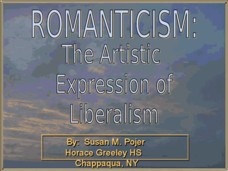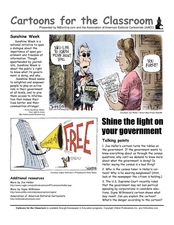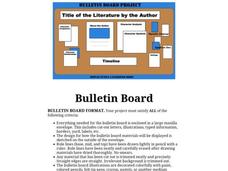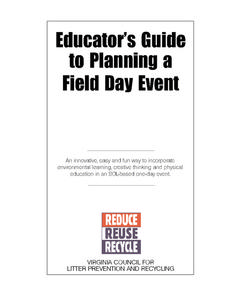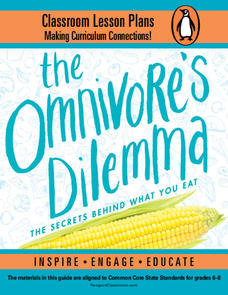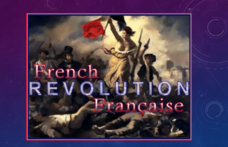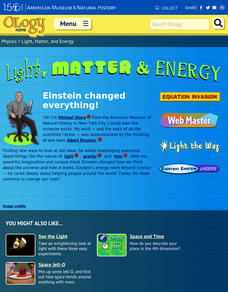Curated OER
Romanticism: The Artistic Expression of Liberalism
The epic clash of reason and emotion comes to life in this informative presentation. Detailing the period of Romanticism in 19th century Europe, these slides contain pictures of the most famous pieces of art during this period. Viewers...
Curated OER
Unit Two: The French Revolution and Napoleon
Have your class define, examine, and explore the causes and effects of the French Revolution. The presentation is organized so that students will be able to take effective notes on each topic covered. Critical thinking is promoted...
Curated OER
Cartoons for the Classroom: Sunshine Week
Do the people have the right to know? Is there a real dialogue between U.S. political powers and the American people? Upper graders evaluate these concepts and more when they critically examine two political cartoons depicting Sunshine...
Curated OER
Cartoons for the Classroom: Shine the Light on Your Government
What don't we know about our government? Explore the concept of transparency and freedom of information throught this analysis handout, in which scholars examine 2 political cartoons. Background information provides context, explaining...
Curated OER
Cartoons for the Classroom: Drawing Attention to Government Secrecy
How much do we know about our government? This engaging topic for teens is made especially interesting through analysis of 2 political cartoons. Background information on Sunshine Week makes the cartoons more accessible, and 3 talking...
Curated OER
Author's Purpose Lesson Plans
Why do we practice identifying the author's purpose? Read this article to gain a better understanding of this reading strategy, and then peruse the attached lesson plans!
Curated OER
Shared Reading Activities
Shared reading is a way to bond together as a family and learn key literature concepts. Great for parents or teachers who want to bring the shared reading experience into the home or classroom. The article offers several tips on what you...
Curated OER
Irony
Using examples from Socrates to Johnny Carson, this slideshow presents your students with the history and definition of dramatic irony, satire, situational irony, and tragic irony. This presentation would be useful in a language arts...
Curated OER
Indian Art
Indian art and architecture is covered from the baths of Mohenjo-daro to the Great Stupa in Sanchi. This presentation shows Indian art as it progressed throughout time but focuses heavily on Buddhist art and architecture that originated...
Curated OER
Antonyms 1
Deepen understanding of basic vocabulary with this antonym sheet. There are only 10 vocabulary words; example words include vacate, renown, wan, and expend. The answer sheet is detailed, defining each word on the page.
Curated OER
Romanticism 1800-1860
What do Roger Chillingworth, Dr. Heidegger, and Ethan Brand have in common? They are all American literature poster boys for Romanticism, advertising the dangers of valuing reason over feeling and intuition. Introduce your class to...
Sandra Effinger
Bulletin Board Project
Imagine a project that informs and entertains. Replace book reports with a bulletin board that highlights all the important elements of a novel. Readers research the author, create a timeline of events in the story, write a character...
Virginia Department of Education
Educator’s Guide to Planning a Field Day Event
Plan an environmentally friendly field day for your young conservationists with this collection of activities and resources. Whether it's bowling with plastic bags full of crumpled up newspaper and empty plastic bottles, or having relay...
Curated OER
Words Can Hurt; Words Can Help
Help learners on the autism spectrum comprehend the social consequences of their actions by connecting kind and hurtful words to physical, tangible experiences. The worksheets in this resource prompt students to consider things they say...
Curated OER
Hero or Tyrant: Connecting Beethoven’s Third Symphony to Napoleon, Part One
The second and third movements of the Eroica, Beethoven's Symphony No. 3, provides listeners with an opportunity to connect to French Revolution and to Napoleon Bonaparte. As they listen to the music, individuals draw what their ears...
Gilder Lehrman Institute of American History
Harriet Beecher Stowe Sends Uncle Tom’s Cabin to Victoria and Albert, 1852
Harriet Beecher Stowe's plea for abolition is not only laid plain in her acclaimed novel, Uncle Tom's Cabin, but in her written correspondence as well. High schoolers read a letter written by Stowe to Prince Albert and Queen Victoria to...
Maryland Department of Education
A Raisin in the Sun and Dreams Deferred
To conclude a study of A Raisin in the Sun and to prepare for a visit to the Lewis Museum, class members analyze Langston Hughes' poem "Harlem." Learners then draw connections to characters in the play and to their own experiences by...
Penguin Books
The Omnivore’s Dilemma, Young Readers Edition
As the saying goes, you are what you eat. A useful set of lesson plans encourage young readers to take a second look at their eating habits. Pre- and post-reading questions bring in reflective writing and discussion while extension...
ProCon
Is Homework Beneficial?
Does homework improve student achievement, or does it increase stress? Scholars use the included debate topics website to prepare for a class discussion or debate about whether homework is advantageous. After reading a brief background...
Beverly Hills High School
French Revolution
What led up to the French Revolution? Middle and high schoolers explore the factors that contributed to the storming of the Bastille on July 14th, 1789, as well as the events following that fateful day, with a presentation on the French...
American Museum of Natural History
Light, Matter and Energy
Let Einstein's work shine the way. Pupils read about Einstein's iconic equation, E=mc^2, using a remote learning resource and see how ideas from other scientists such as Kepner, Curie, Galilei, and Newton led to its discovery. They...
Curated OER
Deism: Paine and Jefferson Student Worksheet
In this Deism instructional activity, students read an article about the opinions of Thomas Paine and Thomas Jefferson. Students then respond to 12 short answer questions.
Curated OER
Japan Becomes an Imperialist Power
On the cusp of the 20th century, Japan was going through many cultural and political changes. From the entrance of Commodore Matthew Perry, to the introduction of Western culture to the Japanese people, this presentation covers the many...
Curated OER
Teaching "Theme" with Children's Literature
In this exercise, learners examine the difference between a theme, topic, and moral. After a class discussion on the definition of literary themes, the instructor reads The Cello of Mr. O by Jane Cutler. Next, individuals analyze the...


